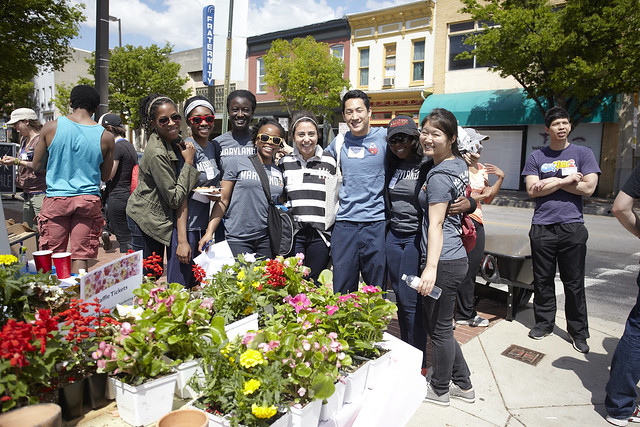Keep Maryland Beautiful Grants Awarded
Supports 13 Environmental Education and Restoration Projects

Pigtown Main Street organized volunteers at the Bloom the Boulevard event to collect litter, spread mulch, plant flowers and prune tree limbs.
The Maryland Environmental Trust today awarded $9,600 to nonprofits, community groups and schools to carry out environmental projects across the state. The grants – given through the Keep Maryland Beautiful program in partnership with the State Highway Administration – will help restore streamside habitats, create gardens and educate citizens about the environment.
“These grants provide funding to help local communities realize and carry out their vision for a healthier environment, while educating the next generation of stewards on the importance of caring for our natural world,” Maryland Environmental Trust Director Bill Leahy said. “Every year we look forward to learning about and providing assistance to citizen groups looking to make a difference in their community.”
The Bill James Environmental Grants were awarded to the following nonprofit youth groups for new environmental education projects:
- Captain Walter Francis Duke Elementary School (St. Mary’s County)
- The Maryland Historical Society (Baltimore City)
- Mountain Laurel Garden Club (Garrett County)
- Queen Anne’s County High School – AP Science Class (Queen Anne’s County)
- Ward Museum of Wildfowl Art (Wicomico County)
- Watson Hall Montessori School (Baltimore County)
The Margaret Rosch Jones Awards were given to the following recipients to support ongoing community education projects that have demonstrated success in solving a local or statewide environmental issue:
- Anne Arundel County Master Gardeners Beekeeping Project, 4-H Foundation (Anne Arundel County)
- The Glen Echo Park Partnership for Arts & Culture (Montgomery County)
- Lake Roland Nature Council (Baltimore County)
- Midshore Riverkeeper Conservancy (Talbot County)
- Pigtown Main Street (Baltimore City)
- Luke’s Episcopal Church (Anne Arundel County)
- Youghiogheny River Watershed Association (Garrett County)
The Maryland Environmental Trust, a unit of the Department of Natural Resources, was established by the state’s General Assembly in 1967 to promote the protection of open lands. It is governed by a citizen board of trustees.
